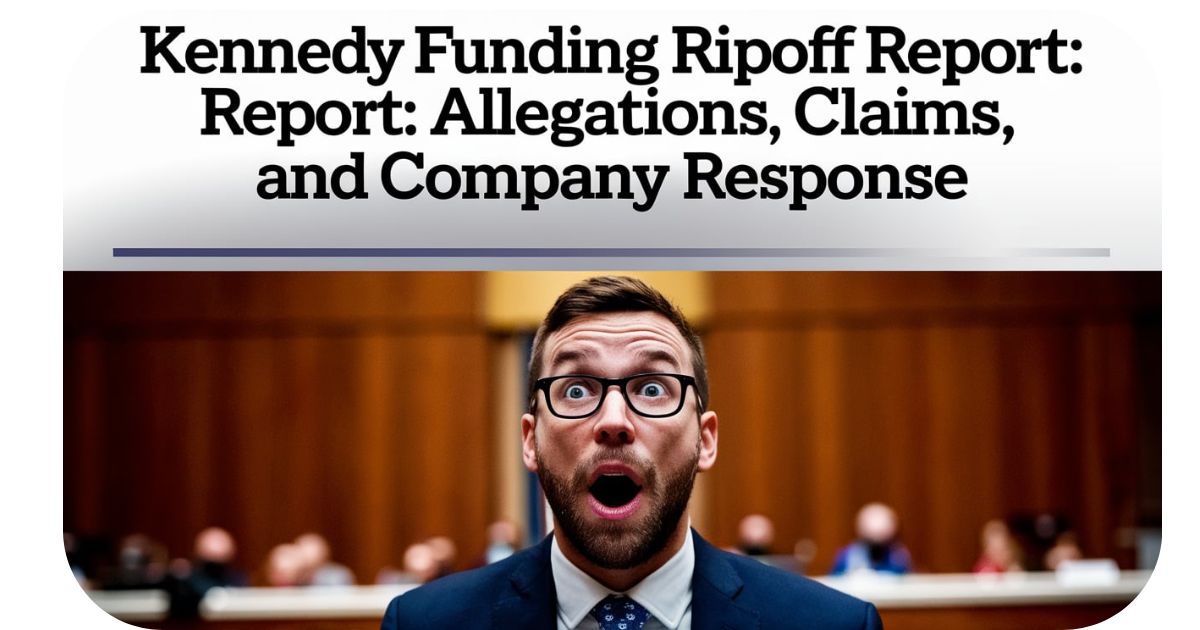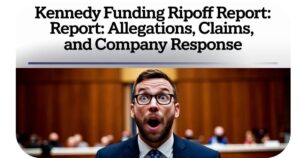Kennedy Funding, a prominent name in the private lending industry, has been a subject of both praise and controversy. Specializing in commercial real estate loans, the company has helped countless borrowers secure funding for high-risk projects. However, like many financial institutions, it has faced its share of criticism, particularly through Ripoff Reports.
This article delves into the allegations against Kennedy Funding, examines the validity of these claims, and explores the company’s responses. Whether you’re a potential borrower, investor, or simply curious about the private lending landscape, this comprehensive guide provides in-depth insights and actionable information.
What Is Kennedy Funding?
Founded in 1989, Kennedy Funding Inc. (KFIC) is a direct private lender that specializes in high-risk commercial real estate loans. Unlike traditional banks, Kennedy Funding offers short-term and long-term financing for large-scale projects, catering to borrowers who may not qualify for conventional loans. The company is headquartered in Englewood Cliffs, New Jersey, and has built a reputation for its flexible lending approach.
Key Features of Kennedy Funding:
- Fast loan approvals: Decisions are based on the property’s value rather than credit scores.
- High-risk lending: Willing to fund projects that traditional banks might reject.
- Diverse clientele: Serves real estate investors, developers, and business owners.
Kennedy Funding’s unique approach to lending has made it a popular choice for borrowers seeking alternative financing solutions. However, its high-risk model has also led to controversies, particularly regarding its transparency and customer service.
What Kennedy Funding Ripoff Report Is All About?
Ripoff Report is a consumer advocacy platform where individuals can file complaints about businesses. For Kennedy Funding, several reports have surfaced, accusing the company of unethical practices. These allegations range from hidden fees to poor customer service.
Common Themes in Ripoff Reports:
- Hidden fees and misleading terms: Borrowers claim that not all costs were disclosed upfront.
- Unfair lending practices: Sudden changes in loan terms and conditions.
- Poor communication: Delays in responding to client inquiries.
While Ripoff Reports can be a valuable resource for consumers, it’s essential to approach them critically. Not all complaints are verified, and some may stem from misunderstandings about the hard money lending process.
The Emergence of Ripoff Reports
Ripoff Report was founded in 1998 as a platform for consumers to voice grievances about businesses. Over the years, it has become a go-to resource for individuals seeking to share their negative experiences. However, the platform’s strict policy against removing complaints—even if proven false—has sparked controversy.
Pros and Cons of Ripoff Reports:
| Pros | Cons |
| Provides a platform for consumer voices | Complaints cannot be removed |
| Helps others make informed decisions | Lack of verification for many claims |
| Encourages transparency | Potential for misuse by competitors |
For businesses like Kennedy Funding, Ripoff Reports can be a double-edged sword. While they promote transparency, they also pose challenges, especially when unverified claims remain online indefinitely.
Role of Ripoff Report in Consumer Advocacy
Ripoff Report plays a significant role in consumer advocacy by allowing individuals to share their experiences publicly. For businesses, however, it can be a double-edged sword. While it promotes transparency, it also poses challenges, especially when unverified claims remain online indefinitely.
How Businesses Can Respond:
- Address complaints publicly: Provide clear, factual responses to allegations.
- Improve customer service: Resolve issues promptly to prevent negative feedback.
- Monitor online reputation: Use tools to track and manage online reviews.
Company History About Kennedy Funding
Kennedy Funding was established to provide fast and reliable financing for businesses and individuals in need of quick cash. Over the years, the company has grown into a well-known name in the private lending industry, particularly for its focus on hard money loans.
Milestones:
- 1989: Founded in Englewood Cliffs, New Jersey.
- 2000s: Expanded services to include international lending.
- Present: Continues to specialize in high-risk commercial real estate loans.
Kennedy Funding’s history reflects its commitment to providing alternative financing solutions for borrowers who may not qualify for traditional loans. However, its high-risk model has also led to controversies, particularly regarding its transparency and customer service.
How Kennedy Funding and Other Businesses Can Mitigate Negative Reports?
Negative reports can harm a company’s reputation, but there are steps businesses can take to mitigate their impact:
Strategies for Reputation Management:
- Build a strong online presence: Share success stories and testimonials.
- Use legal support: Address false claims publicly to restore credibility.
- Prioritize transparency: Clearly communicate fees, terms, and conditions.
- Hire reputation management experts: Professionals can help ensure fair representation online.
How Kennedy Funding Works?
Kennedy Funding operates differently from traditional banks. Its loan approval process is faster and more flexible, making it an attractive option for borrowers in need of quick funding.
Loan Approval Process:
- Application submission: Borrowers provide details about the project and property.
- Property evaluation: The company assesses the property’s value.
- Loan approval: Decisions are made based on the property’s potential rather than credit scores.
Target Clients and Industries:
- Real estate investors: Seeking short-term funding for projects.
- Developers: Needing capital for large-scale developments.
- Business owners: Looking for alternative financing options.
Key Allegations Against Kennedy Funding Ripoff Reports
The most common allegations against Kennedy Funding include:
- Hidden Fees: Borrowers claim that not all costs were disclosed upfront.
- Unfair Lending Practices: Sudden changes in loan terms and conditions.
- Poor Customer Service: Delays in communication and issue resolution.
Investigating the Claims: Are They Valid?
While some complaints may be valid, others could result from misunderstandings about hard money lending. It’s essential to analyze the evidence and compare negative reviews with positive feedback.
Analyzing the Evidence:
- High fees and interest rates: Standard in high-risk lending due to increased risk.
- Miscommunication: Some issues may stem from unclear terms or lack of understanding.
Kennedy Funding’s Response to Allegations
Kennedy Funding has addressed many of the allegations through official statements and proactive measures.
Official Statements:
- The company emphasizes its commitment to transparency and fair practices.
- All fees and rates are disclosed upfront to avoid misunderstandings.
Steps Taken to Resolve Disputes:
- Revised payment plans: Offered to borrowers facing financial difficulties.
- Improved communication: Enhanced customer service protocols.
What Are The Legal Challenges and Outcomes?
Kennedy Funding has faced several legal challenges, including:
- Fraud case (2018): Settled out of court.
- Breach of contract case (2019): Dismissed by the court.
These cases highlight the complexities of the private lending industry and the importance of clear, enforceable contracts.
Impact on Borrowers and Investors
For Borrowers:
- Due diligence: Thoroughly review all loan terms and fees.
- Seek clarification: Ensure a clear understanding of all aspects of the loan.
For Investors:
- Risk assessment: Evaluate the company’s loan portfolio and default rates.
- Market perception: Consider the company’s reputation and ongoing allegations.
Analyzing the Credibility of Kennedy Funding Ripoff Reports
While Ripoff Reports provide a platform for consumer grievances, it’s crucial to approach them critically. Cross-referencing with other sources can offer a more balanced perspective.
Regulatory Environment and Oversight
Kennedy Funding operates within a regulatory framework that governs private lending. Key regulatory bodies ensure compliance with financial laws and protect consumer interests.
Common Misconceptions
- All private lenders are untrustworthy: While some have faced allegations, it’s not indicative of the entire industry.
- High fees equate to fraud: Higher fees in private lending often reflect the increased risk undertaken by the lender.
What Are The Future Outlook For Kennedy Funding?
The private lending industry continues to evolve, with increased calls for transparency and regulation. For Kennedy Funding, maintaining ethical practices and addressing past allegations proactively will be crucial in sustaining its position in the market.
Conclusion
While Kennedy Funding has faced significant allegations, it’s essential to approach such claims with a balanced perspective. Potential clients and investors should conduct thorough research, seek clarity on all terms, and make informed decisions based on a comprehensive understanding of the company’s practices and the broader industry landscape.
FAQs
What are the main allegations against Kennedy Funding?
The primary allegations include hidden fees, misleading loan terms, unfair lending practices, and poor customer service.
How has Kennedy Funding responded to these claims?
The company asserts that it operates within legal and ethical boundaries, emphasizing transparency and clear communication of all fees and terms.
What legal challenges has Kennedy Funding faced?
Notable legal challenges include a fraud case settled out of court in 2018 and a breach of contract case dismissed in 2019.
How credible are the Ripoff Reports?
While they highlight consumer grievances, it’s essential to cross-reference these reports with other sources to obtain a balanced view.
What steps should potential borrowers take?
Conduct due diligence, seek clarification on all loan aspects, and ensure a clear understanding of all terms and fees before proceeding.
What is hard money lending?
Hard money lending involves providing loans based on the value of the property rather than the borrower’s credit score.
Who are Kennedy Funding’s target clients?
Kennedy Funding serves real estate investors, developers, and business owners.
How does Kennedy Funding’s loan approval process work?
The process involves property evaluation and approval based on the property’s value, not credit scores.
What is the role of Ripoff Report in consumer advocacy?
Ripoff Report allows consumers to share grievances publicly, promoting transparency and informed decision-making.









